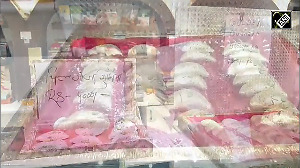Milad Siri wears an Islamic headscarf and a long black abaya on her way to work and carries a handgun in her purse.
Once she gets there, the scarf and cloak come off to reveal a scanty golden outfit. The gun is tucked away and the music starts to blare.
Belly dancer Siri has been performing since 1996. The Islamic dress and gun are new and necessary accessories since the fall of Saddam Hussein on April 9.
"Before the war I was practising my work freely. It was quite normal for me to stay out late after midnight but now I have to be at home before six in the evening," said 27-year-old Siri, who lives in a small apartment in a poor Baghdad suburb.
The war to topple to Saddam was followed by a wave of insecurity and lawlessness, which Iraqis complain US troops have done little to tame.
For women, the streets of Baghdad are a more dangerous place, and an upsurge in religious fervour means they must stick to Islamic dress if they want to be left alone.
"It is difficult for me now to walk on the streets wearing jeans. There is no security on the streets and especially for someone who was known as a dancer," said Siri, a chain smoker.
"I do not like the abaya and the head cover. I usually wear them when I visit holy shrines but now I am obliged to wear them all the time. They restrict my freedom," she said.
The biggest problem for Siri is that since the war, demand for belly dancers in the Iraqi capital has dwindled. She works only rarely, at private birthday or wedding parties.
"I used to make up to two or three million Iraqi dinars a month ($1,300-$2,000), but now things have changed. Parties have become very rare, one every two weeks or every month," she said.
With her slim figure and short hair, Siri does not resemble the stereotype of Egyptian belly dancers.
"I love short-cut hair, but when I dance I wear a wig with long red curly hair," she said.
Divorced with a 12-year-old son, and responsible for making a living for her mother and three brothers, Siri found refuge in dancing.
"I always dreamed of being a belly dancer and thank God I was able to be one," said Siri who was an admirer of the well-known Egyptian belly dancer Suhair Zaki.
"When I dance I forget the whole world and the people," she said. "When I dance I go to a dream world, where there is nobody except me and the music. I turn into a dove or a butterfly."
Siri saw no contradiction between religion and her work, saying that dancing was her only means of earning money.
"Religion is something and my life is something else. I pray and read the Koran, but dancing is my work. This is life."
Islam forbids dancing and Muslim women are banned from showing any parts of their body except face and hands.
"I definitely fear God's punishment, but it is the only way I know to earn money," she said. "What can I do? I need money for the survival of my family and my son."
Siri got married at 14, and was divorced two and a half years later. She said she started to dance in 1996 to make a living for her family.
"I do what I want, and thank God I was able to do it without help from any body," she said confidently. "I am not doing something wrong. Dancing is an art. I do not hurt anyone and I am the one who decides the way of life I want."
Siri misses dancing for one of her best customers, Saddam Hussein's son Uday.
She said that she used to get 500,000 dinars for one hour dancing at public parties but more when she danced at events organised by Uday, known as a womaniser who threw wild parties.
"I danced many times in parties hosted by Uday at his Hunting Club, and I danced once in a party of his brother Qusay," she said.
"Sometimes I stayed to chat with Uday after I ended my dance. He had an easy manner. He never did anything to offend me," she said. "It is true that he used to drink a lot but he always kept in good control of himself."







 © 2025
© 2025